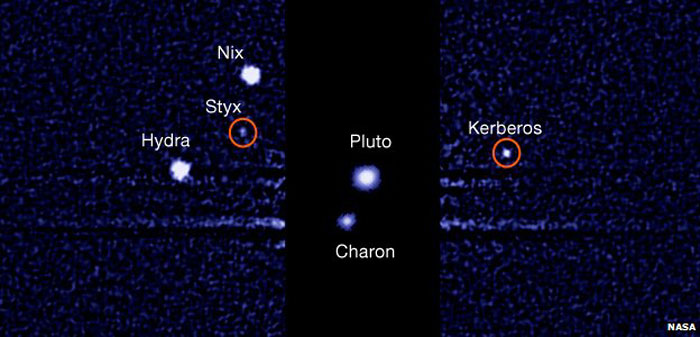.

The objects formerly known as P5 and P4 were only spotted one and two years ago, respectively
.
The recently discovered fourth and fifth moons of Pluto now have official names: Kerberos and Styx.
The International Astronomical Union (IAU), charged with making official name designations, stipulates in its rules that names derive from mythology.
The names - referring to a three-headed dog and a river separating the living from the dead, ranked second and third in an international public vote.
The winning submission, Vulcan, was vetoed by the IAU.
The two moons, formerly known simply as P4 and P5, were only discovered in July 2011 and July 2012, respectively.
Both were spotted by a team using the Hubble space telescope, led by Mark Showalter, senior scientist at the Seti Institute.
The team was initially on a hunt for rings around the dwarf planet - it lost its status as a full planet in 2006.
The ensuing hunt for further planets and objects around it was supported in part by the New Horizons mission, which launched in 2008 on a course toward Pluto and the Kuiper belt of objects beyond it.
It had been suggested that cosmic debris around the dwarf planet may pose a threat to the probe.
Shortly after the first new moon was found, another followed, and the IAU was in the market for two appropriate new names - and the Pluto Rocks! online vote was begun - receiving over half a million votes.
"I was overwhelmed by the public response to the naming campaign," Dr Showalter said.
Vulcan was a suggestion made by William Shatner of the television show Star Trek - the name of the home planet of character Mr Spock.
Although it was a clear winner among the votes, the IAU opted not to use it, on the grounds that it is used elsewhere in astronomy, and not sufficiently associated in mythology with Pluto, the ruler of the underworld.
.
Quelle: BBC
5963 Views
